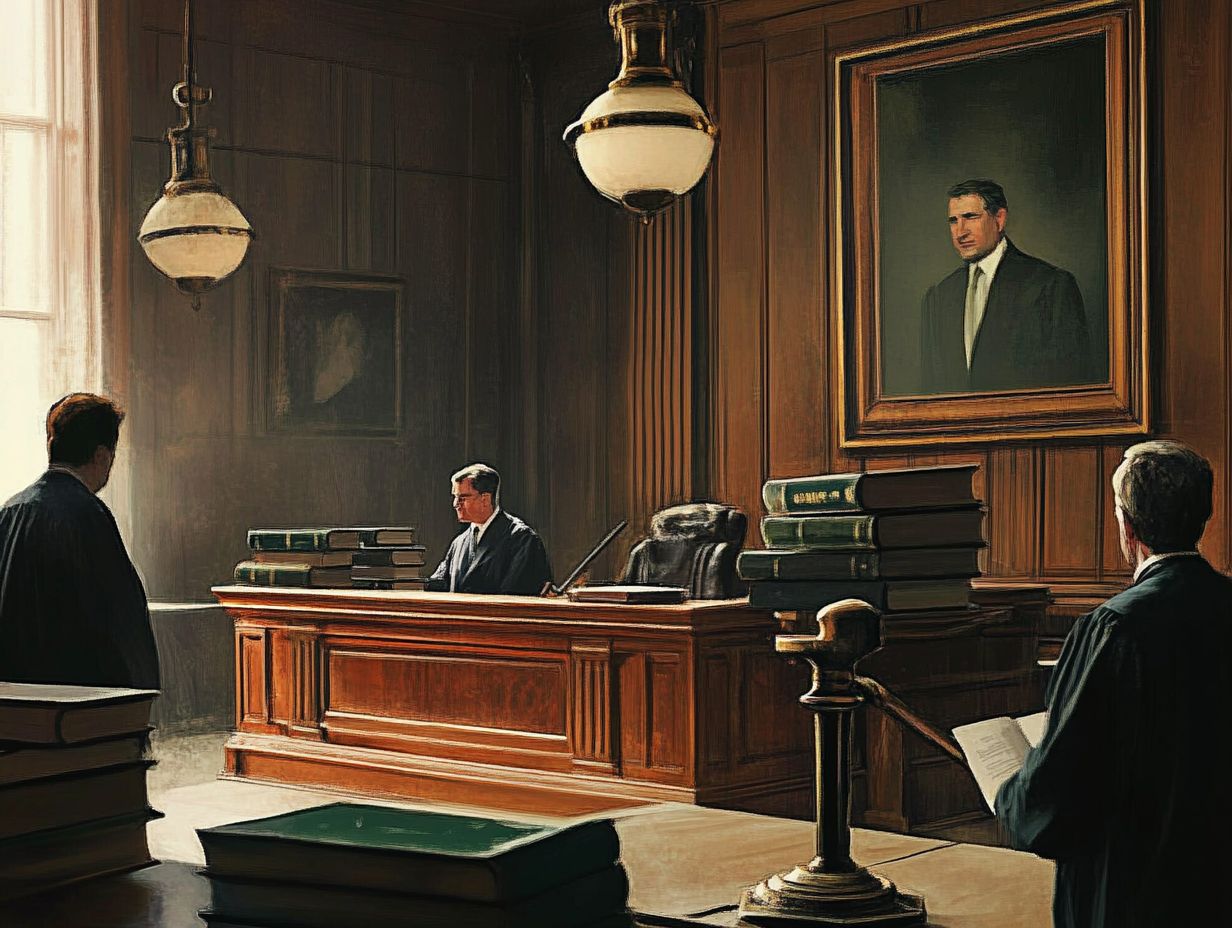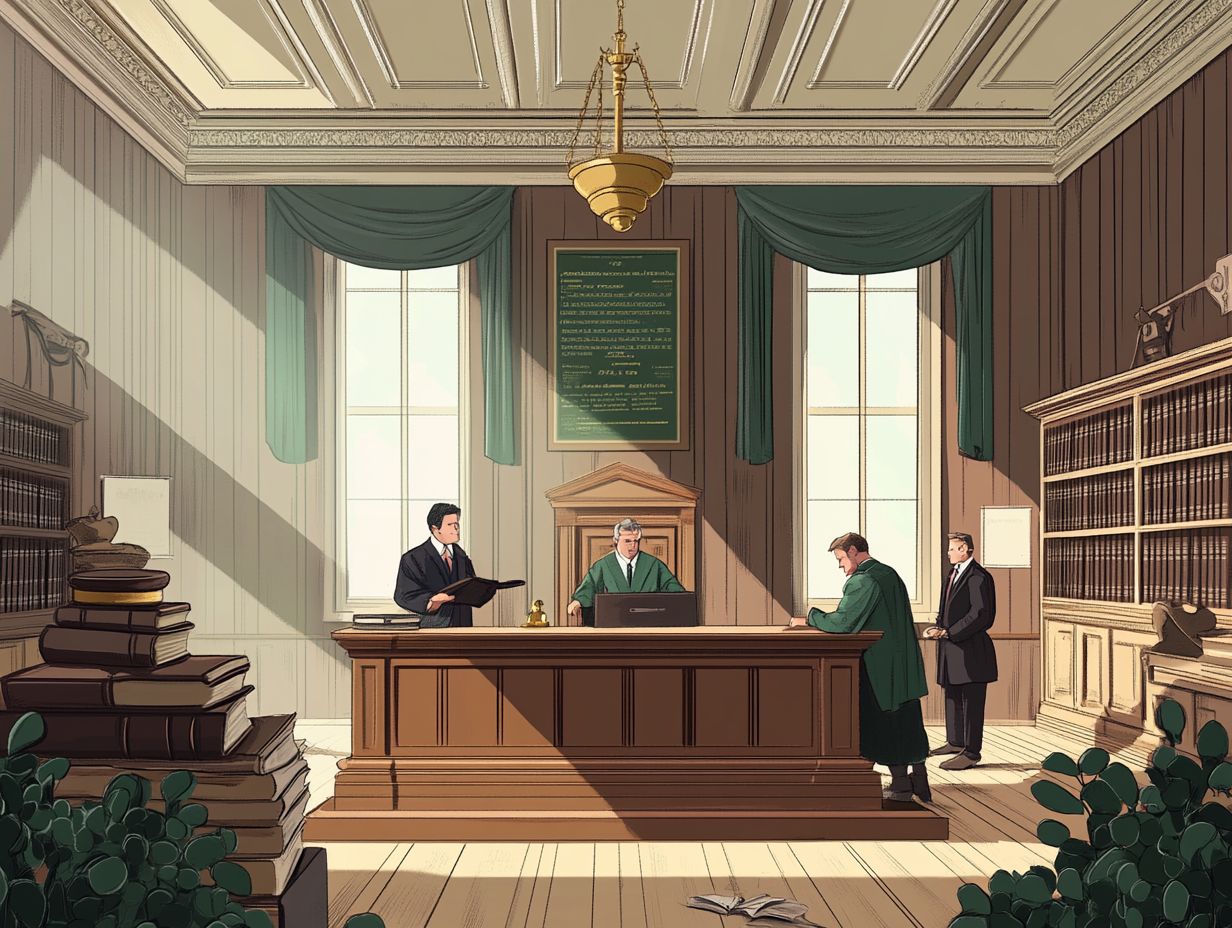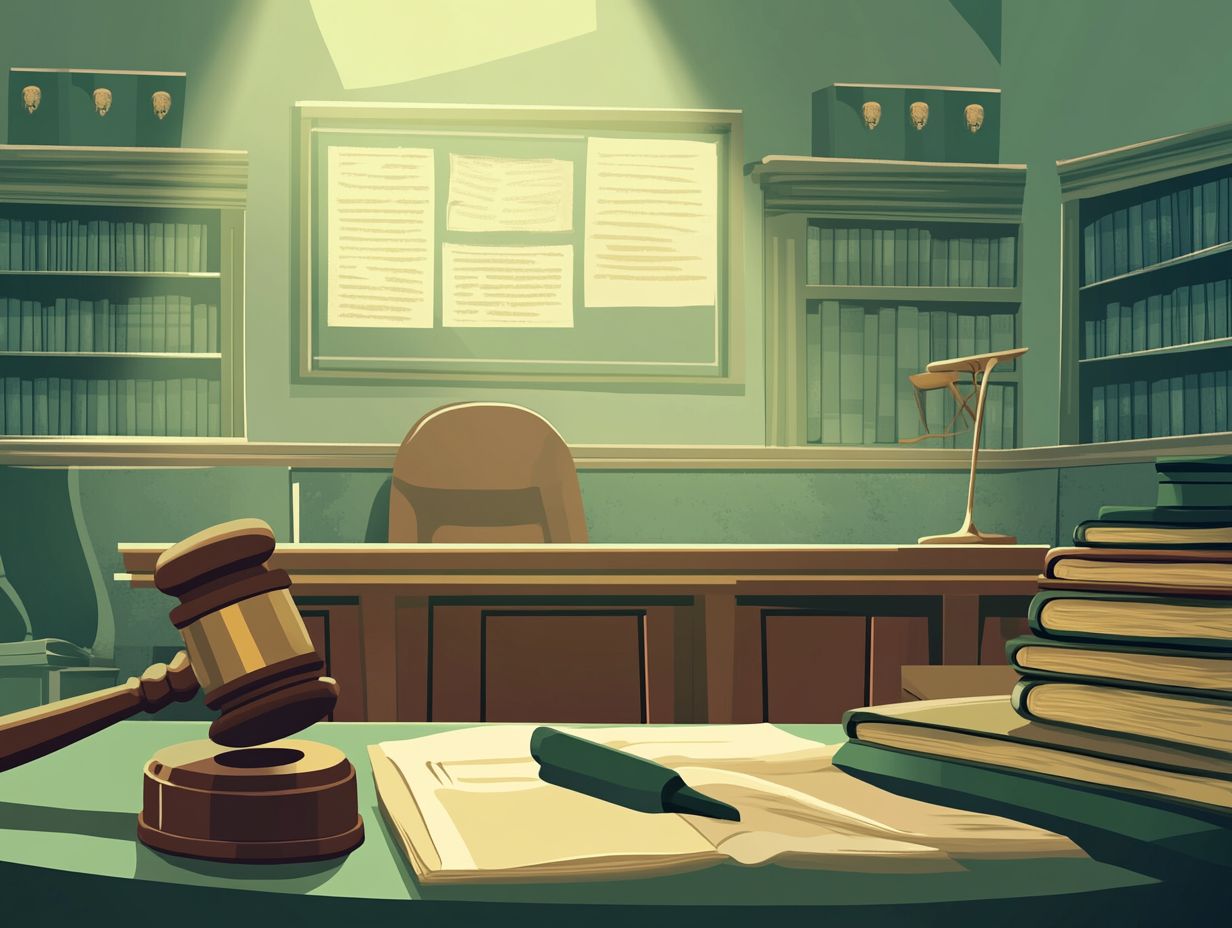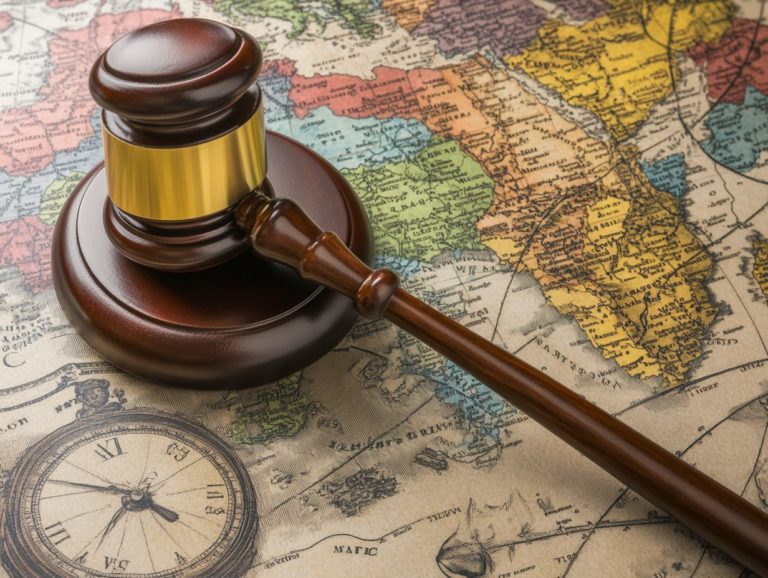The Importance of Case Law in IP Litigation
In the intricate world of intellectual property (IP) litigation, case law is a cornerstone that shapes legal outcomes and strategies. Understanding how important cases set rules for future ones is essential for anyone navigating this complex field.
This article will explore the definition and importance of case law, highlight key types and recent trends, and discuss how these legal precedents protect and enforce IP rights.
You ll also discover practical strategies for using case law in your legal arguments. Additionally, we ll explore the challenges that practitioners may encounter along the way.
Get ready to dive into the exciting world of case law and its profound impact on IP litigation.
Contents
- Key Takeaways:
- Understanding Case Law in IP Litigation
- Types of Case Law in IP Litigation
- How Case Law Shapes IP Litigation
- The Impact of Case Law on Intellectual Property Rights
- Using Case Law in IP Litigation
- Challenges and Limitations of Case Law in IP Litigation
- Frequently Asked Questions
- What is the significance of case law in IP litigation?
- How does case law impact the outcome of IP litigation cases?
- Why is it important for lawyers to be familiar with case law in IP litigation?
- Can case law be challenged in IP litigation cases?
- What happens if there is no relevant case law for an IP litigation case?
- How does case law help in shaping and developing IP laws?
Key Takeaways:

- Case law is vital in IP litigation. It shapes strategies and influences how IP rights are enforced.
- Important cases and recent developments are key factors in IP litigation, impacting legal arguments and decision-making.
- While case law provides valuable guidance, it also presents challenges and limitations that must be addressed.
Understanding Case Law in IP Litigation
Understanding case law in IP litigation is essential for navigating the complex legal landscape of IP rights. This includes various legal proceedings that highlight the importance of IP education in litigation and set important precedents for future cases.
This body of law acts as a court system, shaping how courts interpret and enforce IP rights whether they are patents, copyrights, trademarks, or trade secrets. With judicial transparency and well-documented legal precedents, case law provides a clear roadmap to effectively tackle violations of rights and pursue recovery of damages.
Types of Case Law in IP Litigation
The types of case law in IP litigation vary significantly, shaped by the specific IP rights at stake, including patents, copyrights, and trademarks. For a deeper insight, consider understanding the role of the court in IP litigation.
Each category has its unique legal frameworks and challenges.
Specialized IP courts address a wide range of issues arising from patent protections, copyright regulations, and trademark rights. The rulings from these courts establish significant precedents that influence future litigation.
This diversity highlights the complex legal landscape of different IP types, compelling practitioners to tailor their strategies to the specifics of each case.
Important Cases
Important cases in IP litigation are crucial in shaping the legal landscape, establishing precedents that influence future decisions and interpretations of IP rights. Understanding the role of evidence in IP litigation cases often involves complexities that highlight the economic value of IP across various industries, guiding judicial bodies in their rulings.
Notable examples demonstrate how these decisions impact rights holders in sectors ranging from smartphones to entertainment. For instance, cases like Apple v. Samsung and the landmark Supreme Court ruling in MGM Studios v. Grokster have not only determined outcomes for the parties involved but also set standards for how courts assess patent and copyright infringement.
The implications for your future litigation strategies are considerable, as these rulings inform the arguments and approaches you may adopt to protect your innovations and creative works. As a rights holder, you need to navigate the intricacies of these precedents to safeguard your assets.
This makes these cases essential study material for both current and aspiring legal professionals like you.
Recent Developments and Trends
Recent developments in IP litigation reveal emerging trends that shape how you protect and enforce your rights to own ideas in today s economy. From new licensing agreements to rising concerns about stealing trade secrets, these trends reflect shifts in the legal landscape, necessitating adaptive strategies.
As courts respond to these developments, staying alert is key to protecting what s yours! Understanding the evolving legal environment is crucial.
When analyzing the implications of these shifts, it becomes clear that stealing trade secrets is on the rise. Now is the time to rethink your protection strategies. The surge in digital technologies makes it easy for competitors to infringe on your ideas, leading to a more aggressive approach to litigation.
Recent changes in licensing agreements urge organizations like yours to create more flexible and comprehensive terms that address these heightened risks. This means you should prioritize collaboration with legal experts to refine your strategies, focusing on proactive measures to safeguard your assets from theft and unauthorized use.
How Case Law Shapes IP Litigation

Case law plays a pivotal role in shaping IP litigation, influencing your legal strategies and guiding you through the intricacies of enforcing your rights to own ideas, including understanding the importance of IP due diligence in litigation.
By relying on established precedents, you can inform both your litigation tactics, enabling you to implement effective risk management practices that safeguard your exclusive rights.
Understanding the relationship between case law and enforcement mechanisms is essential for ensuring strong protection against infringement and carving out a viable path for recovering damages.
Influencing Legal Strategies
Legal strategies in IP litigation increasingly draw from case law. Analyzing past rulings helps shape your approaches in settlement negotiations and understanding the role of international law in IP litigation and litigation processes.
By grasping the nuances of case law, you can navigate potential infringement cases more adeptly and enhance your chances of financial damages and favorable outcomes.
This adaptability in your legal strategies, informed by judicial experiences, creates a dynamic approach to IP enforcement. For instance, a landmark decision regarding patent validity can set the tone for future cases, guiding how you evaluate arguments and decide whether to pursue settlement or litigation.
Previous rulings on copyright infringement offer valuable insights into what constitutes fair use. Understanding these precedents directly influences your negotiation tactics in various copyright-related disputes.
By formulating well-informed strategies, you enhance your leverage in negotiations and better safeguard your rights to own ideas.
The Impact of Case Law on Intellectual Property Rights
The impact of case law on intellectual property rights is profound. It delineates the protective measures available to rights holders and establishes the standards for enforcement mechanisms across various legal contexts.
With a commitment to judicial transparency in decision-making, case law clarifies the scope of IP rights, directly influencing how infringement cases are assessed and pursued in civil courts.
This continuous evolution shapes the legal landscape surrounding intellectual property, significantly affecting both rights holders and practitioners in their pursuits.
For personalized advice on IP protection, consider consulting a legal expert today!
Protecting and Enforcing IP Rights
To protect and enforce your intellectual property rights, you need to manage the complexities of case law. This law provides important guidance on what counts as infringement and the legal remedies available to you.
The changing landscape of case law highlights effective protective measures and shows the need for legal expertise in IP litigation. Understanding the importance of client communication in IP litigation is crucial for ensuring strong enforcement of your IP rights across various industries.
To effectively shield your intellectual property, your strategies should be multi-faceted. Combine proactive monitoring with responsive litigation measures when needed. Staying informed about judicial precedents can be a game-changer, as these decisions shape the definition of infringement.
Legal professionals are essential in this field. They help you understand the nuances of IP laws and navigate the details of existing agreements, such as licenses and trademarks. By leveraging legal insights and case rulings, you can defend your assets and deter potential infringers, fostering a culture of respect for intellectual property.
Using Case Law in IP Litigation
Utilizing case law effectively in IP litigation can enhance your legal arguments significantly. It provides a strong foundation, especially when considering the importance of a strong IP policy in litigation, as you navigate the complexities of the judicial system.
By leveraging established precedents and insights from respected judges, you can craft compelling arguments that address your specific case and reflect the broader legal landscape.
This strategic application of case law is essential for achieving success in the competitive realm of IP enforcement, highlighting the importance of documentation in IP litigation.
Strategies for Incorporating Case Law in Legal Arguments

Mastering case law strategies can be your secret weapon in IP litigation! These strategies provide a solid foundation for crafting compelling cases and increasing your chances of recovering damages.
By mastering the art of leveraging legal precedent, you can present your arguments in a way that resonates with judges and aligns seamlessly with existing case law. This strategic integration is vital for success in any IP litigation endeavor.
Systematically outlining relevant precedents highlights the consistency of your claims with prior rulings. This creates a persuasive narrative that captures the court s attention. Integrating examples can simplify complex legal principles and demonstrate their relevance to your case.
For instance, citing landmark decisions on patent infringement using someone s patented invention without permission can emphasize the importance of claiming scope and inventive step, guiding judges in evaluating your case.
Utilizing a case law matrix can streamline your referencing of pertinent decisions. This showcases your expertise in navigating legal intricacies while bolstering your arguments.
Challenges and Limitations of Case Law in IP Litigation
Navigating the complexities of case law in IP litigation presents considerable challenges and limitations. These can create significant hurdles for IP owners.
Definitions of infringement and the evolving landscape of case law can spark conflicts that complicate legal proceedings. You must formulate strategic responses as an IP owner.
Understanding these challenges is essential for crafting effective litigation strategies in this dynamic environment.
Addressing Potential Issues and Conflicts
Addressing potential issues in IP litigation requires a strong understanding of case law, as highlighted in the role of data in IP litigation decisions. This knowledge is vital for effective risk management.
Be proactive in spotting and reducing risks related to infringement. The legal landscape is constantly changing, and staying ahead is crucial.
Developing solid strategies helps you protect your intellectual property. This includes analyzing relevant precedents and conducting thorough risk assessments.
Understanding current case law and anticipating future trends is essential. These insights shape your enforcement strategies.
Effective communication with your legal team and stakeholders is key. Everyone should be aligned on objectives and expectations.
Implementing strong enforcement mechanisms can enhance your position in disputes. Prioritizing these strategies will help you protect your intellectual assets in a rapidly changing legal environment.
Frequently Asked Questions
What is the significance of case law in IP litigation?
Case law is the body of law created through past court decisions. It guides judges and lawyers in resolving cases and sets a precedent for future rulings.
How does case law impact the outcome of IP litigation cases?

Previous decisions provide a framework for current cases. Judges often rely on established precedents to guide their decisions.
Why is it important for lawyers to be familiar with case law in IP litigation?
Lawyers need to understand case law to argue effectively. They should reference relevant precedents and differentiate similar cases with different outcomes.
Can case law be challenged in IP litigation cases?
Yes, case law can be contested through appeals. Lawyers must present strong evidence to support their arguments for overturning previous rulings.
What happens if there is no relevant case law for an IP litigation case?
If relevant case law is absent, judges may turn to statutes, regulations, or legal principles. This can make case outcomes unpredictable and lead to more litigation.
How does case law help in shaping and developing IP laws?
Judges set precedents that actively shape IP laws. Case law provides valuable guidance for lawmakers to make necessary updates reflecting current circumstances.






